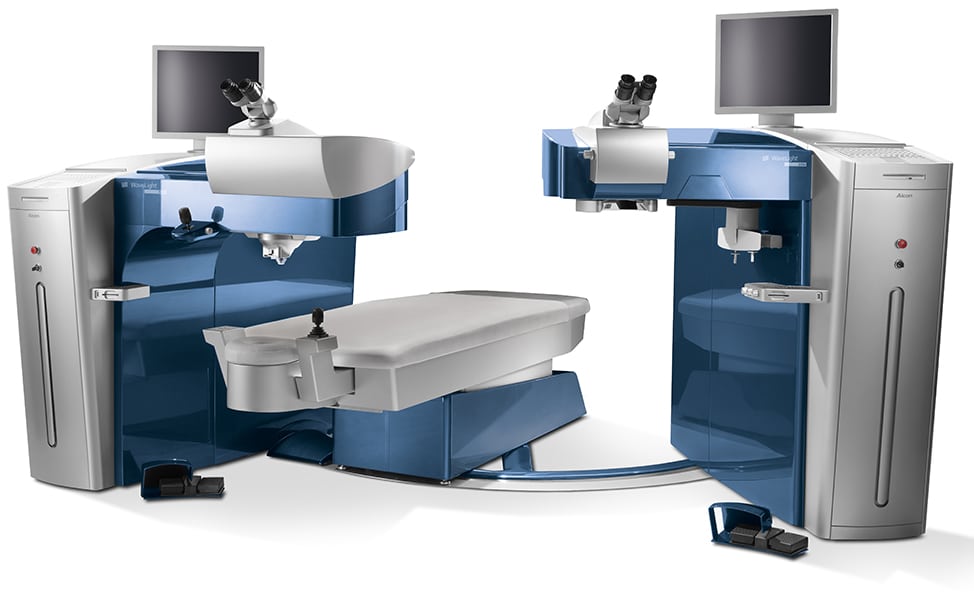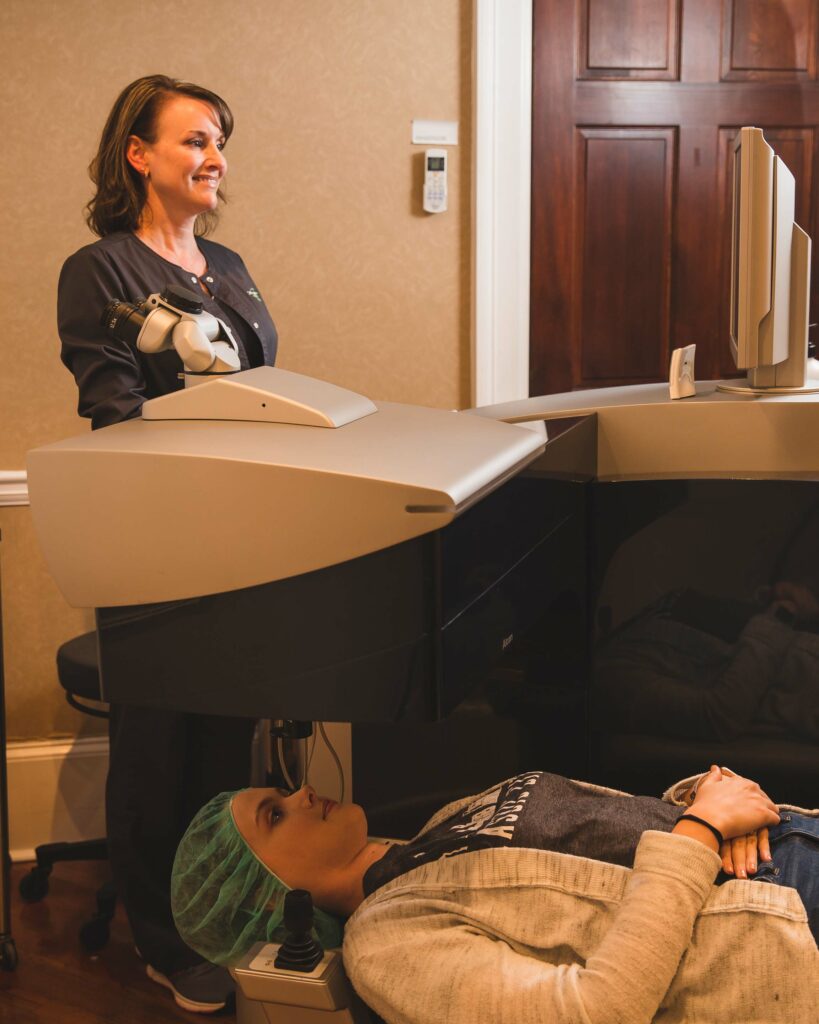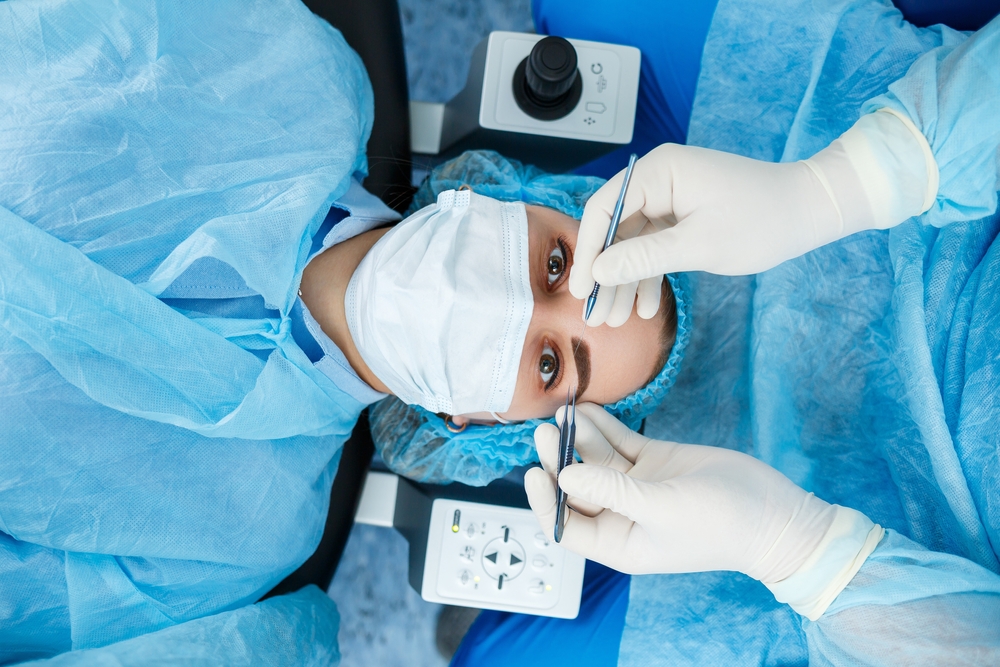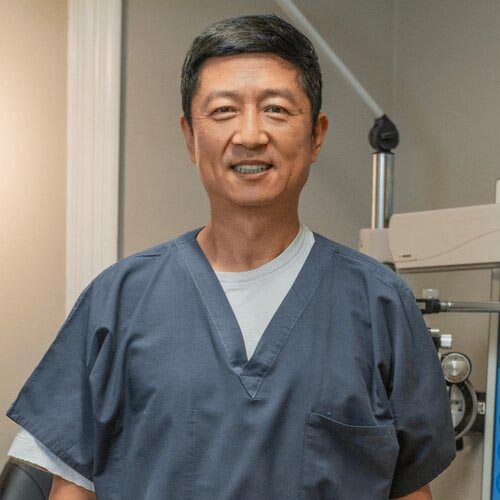LASIK

Do you want to reduce your dependence on visual aids? One option worth considering is a laser vision correction procedure called LASIK. Here at Georgia Center for Sight, Dr. Dong has helped many patients achieve the vision of their dreams.
What is LASIK?
LASIK is a laser vision correction procedure that treats refractive errors. These include nearsightedness, farsightedness, and astigmatism.
LASIK uses excimer and femtosecond lasers to reshape the cornea, correcting refractive errors and improving your vision. It is a permanent procedure. Altering the shape of your cornea changes how it refracts or focuses light on your retina. Focused light in your eye results in clearer vision.
After LASIK, many patients start experiencing almost instant visual improvements in the hours and days following the procedure. Combined with a brief recovery period, it’s easy to see why LASIK is the most popular medical elective procedure you can undergo.
How Does LASIK Work?
LASIK works because it uses a femtosecond laser and an excimer laser to reshape the cornea and improve your vision. The femtosecond laser first creates a flap in the cornea.
After making the flap and pulling it back, Dr. Dong will use the excimer laser to reshape the cornea by removing a precise and predetermined amount of tissue. The excimer laser is preprogrammed to your exact eye measurements to ensure only the tissue necessary is removed and nothing more. Dr. Dong will then put the flap back into place where it will act as a natural bandage in the eye during the LASIK recovery process.
Are You a Good Candidate for LASIK?
Take our LASIK Self-Test and find out.
Allegretto WaveLight Mapping

One of the reasons why LASIK is such a precise and accurate method of vision correction is that it uses digital mapping. At Georgia Center for Sight, Dr. Dong uses Allegretto Wavelight mapping. WaveLight mapping allows your LASIK surgeon to scan your eyes, obtaining a one-of-a-kind map of your eyes and your unique visual imperfections. As no two eyes are the same, your surgeon can have the most accurate view of your eyes possible during the LASIK procedure.
The map of your eyes is used during LASIK to program the laser and directly address any visual aberrations and imperfections. WaveScan-based digital technology (used initially with high-powered telescopes to reduce distortions when viewing distant objects in space) can measure and correct deficiencies up to 25 times more precisely than corrections used with glasses and contact lenses.
The information from the WaveScan technology provides the most precise and accurate results possible. This information allows patients to achieve the most optimal visual outcomes, going far beyond the capabilities of their original prescription with visual aids.
Contoura LASIK
Georgia Center for Sight is proud to offer our patients Contoura LASIK. Contoura LASIK uses revolutionary laser technology to improve patients’ sight drastically more than traditional LASIK procedures. Contoura LASIK is innovative because it optimizes the cornea’s surface while diagnosing any perceptible imperfections. The result enhances vision significantly beyond what was possible with traditional LASIK methods.
Contoura technology allows patients to receive individualized treatment depending on their visual needs. It means patients end up with clearer vision after undergoing Contoura LASIK than with glasses or contact lenses.

What Happens Before LASIK?
Dr. Dong and his staff at Georgia Center for Sight will help prepare you for LASIK. Before undergoing LASIK, ensure you’re ready and comfortable with all aspects. Your comfort is a necessity, so ensure you’ve asked any questions about the vision correction procedure to apprehend any anxiety or nerves you have. There are a few things you can do to prepare for and have the best possible LASIK recovery.
These include wearing comfortable clothes on the day of your procedure, arranging a ride home with a friend or family member, and resting once you get home. Doing these things before your procedure will make the days after easier. Make sure you follow any instructions from Dr. Dong regarding taking certain medications and picking up prescription eye drops before your procedure.
What Happens During LASIK?
During the procedure, you will be lying on your back and awake. Before LASIK begins, Dr. Dong will give you numbing eye drops to ensure you won’t feel any pain during LASIK.
He will use a device to hold your eyelid open and ask you to focus on a light to keep your eye in position. LASIK uses a femtosecond laser to reshape your cornea. Your cornea is the clear window on the surface of the eye.

After the eye drops take effect, Dr. Dong will create a flap within the outer layer of your cornea called the epithelium. After making the flap, Dr. Dong will pull it to one side of your eye. He will replace it at the end of the procedure. Making the flap gives Dr. Dong access to the thicker middle layer of your cornea, called the stroma.
With this access, Dr. Dong will use the excimer laser to remove a predetermined amount of tissue from your cornea. This process gives your cornea a smoother surface, allowing it to focus light better. After Dr. Dong finishes reshaping the cornea, your LASIK procedure is complete! Dr. Dong will replace the flap over your eye, which acts as a bandage during recovery.
Altogether, the LASIK procedure takes less than thirty minutes to complete. You may notice improvements in your eyesight within a few hours of having LASIK, but it may take a few days after the procedure to see changes as well.
Each patient is unique, and their eyes adjust differently after having LASIK.
What Can You Expect After LASIK?
After undergoing LASIK, you may notice that your eyes feel dry, itchy, or irritated. These side effects are typical. As the numbing eye drops wear off, you may feel more uncomfortable. You can combat any feelings of dryness using artificial tears or eye drops. Avoid rubbing your eyes, as this can damage the delicate flap created during LASIK. Dr. Dong will prescribe eye drops to combat infection and inflammation. You must take these exactly as directed.
You will not fully heal from LASIK for six to twelve months following the vision correction procedure. However, even as your eyes continue healing, you’ll be able to return to many, if not most, of your usual activities. Improvements to your vision will continue in the days and weeks after LASIK. You’ll need to return to see Dr. Dong for a follow-up appointment the day after your LASIK procedure.
At your first follow-up appointment, we will look for any signs of infection or visible complications. You’ll need other follow-ups in the months following LASIK, so attend any scheduled to ensure your eyes are healing as they should. If you experience eye pain or have concerns about worsening vision, do not wait until a follow-up appointment to let us know, as this may be a sign of a complication. During recovery, avoid contact sports and strenuous activities for the first month.
You’ll also want to stay away from bodies of water, as water can carry bacteria, and your eyes are more susceptible to infections while first healing. As you recover, you’ll be able to appreciate the world with your new, incredible vision.
Most LASIK patients end up with 20/20 vision or better, which is only part of why LASIK has a 96% satisfaction rate with patients! Colors look brighter, details are sharper, and most importantly, you can see everything around you without depending on visual aids.
Find out more about LASIK by scheduling your LASIK consultation at Georgia Center for Sight in Athens, GA, today!
Request an Appointment
